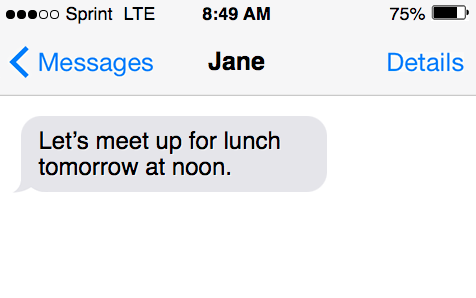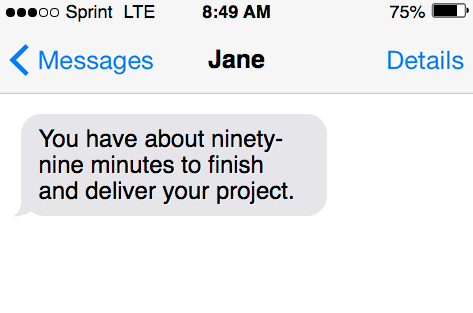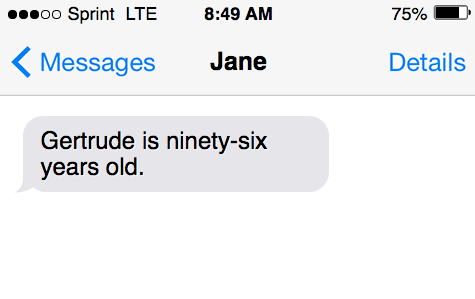When trying to spell out numbers, its acceptable to get confused. Even native English speakers find it hard to spell words sometimes.
Definition of Ninety
90 or Ninety refers to the number (numerical digit) present between 89 and 91. This cardinal number is calculated by multiplying 9 x 10.
Ninety constitutes an integral part of math. For example, in the geometry field, a 90 degree right angle is referred to often.
The number 90 gets used in other common places like percentages, articles, books, and more.
| Number | Definition |
| Ninety (noun) /ˈnīn(t)ē/ | equivalent to the product of nine and ten; ten less than one hundred; 90. |
Difference Between Ninety and Ninty
One easy way to tell them apart is using the letter E; ninety has it, but ninty doesn’t.
The most significant difference between these two words is that ninty isn’t an accurate word.
Ninty is a misspelling of the word ‘Ninety.’ A common reason for the misspelling is that many other numbers don’t have an “E” letter associated with them. For example, “five” and “fifty.” Or “six” and “sixty.”

When to Use Ninety
Remember, the numerical word ‘Ninety’ means the number 90.
Sometimes, it’s better to spell out numbers rather than write them as numerals. In fact, it’s grammatically correct to spell them in their entire word form when used in common sentences.
For example, we wouldn’t want to say “90 nine numbers of things.” Because the number 90 is higher than ten, it’s suggested (by many style guides) to write it in written form rather than numerical form.
That way the sentence can read like the following, “Ninety-nine numbers of things.” Reads better, right?
Here’s an example of an incorrect sentence:
“I want to go to 90 concerts this year.”
A correct sentence would be:
“I want to go to ninety concerts this year.”
Sentence Examples
To help understand better let’s use ‘Ninety’ in various sentences. It will help you better understand what we are talking about.
They are as follows:
- Ninety is the atomic weight of an isotope in metal strontium.
- A full-sized baseball diamond features over ninety feet right between its bases.
- Lilian Parker has a stunning net worth of ninety million.
- You have about ninety-nine minutes to finish and deliver your project.
- The malaria department witnessed a ninety percent increase in their cases as of 2022.
- Gertrude is ninety-six years old.
- We need someone who can bring a ninety percent increase to the sales department.
- The lyrics go like this ‘Ninety percent skill and the power of will.’
- I am ninety-nine percent sure that it was all just a dream.
- You’ll be buried ninety feet deep before you ever cross me again.
- According to a recent study, a staggering ninety-five percent of the women in this city get sexually harassed.
- My current weight is ninety-two kilograms.
When to Use Ninty
You should always spell 90 as ‘Ninety‘ and not ‘Ninty.’
Because ninty is a misspelling of ninety.

Sentence Examples (Incorrect Sentences)
You need to understand that there are no correct sentence examples for the word ‘Ninty.’
But here are some examples of how someone can misspell it in sentences:
- My grandmother is turning ninty years old tomorrow.
- The country took ninty years to recover from the economic drought.
- Is it coming up to ninty degrees?
- The shipwreck was found ninty feet below.
Should Numbers Get Spelled Out
A good rule of thumb is that numbers smaller than ten can get used in their numerical form (1, 2, 3, 4, 5, 6, etc.). And numbers larger than 10 should get spelled out (eleven, twelve, thirteen, fourteen, etc.).
Paired number examples
- Incorrect: 12 15-year-old students.
- Correct: Twelve 15-year-old students.
Always spell the word out when there are paired numbers.
Decades and centuries
- Correct: It happened in the last 1950s.
- Correct: It happened in the fifties.
Both are acceptable ways to refer to a decade or century.
What is the Correct Spelling of the Number 90?
The correct way to spell 90 is ‘NINETY.’
Here’s a trick to remember: whenever you are trying to spell 90, ensure that you remember the spelling of the number ‘Nine’ and add a ‘Ty’ to it. Thank you! Or, nine thanks you!
Here’s another fun one: Nine drinks TEA. Or Ninety.

How to Remember Which Form to Use
Generally, always use the word “ninety” because it is a number greater than 10. Refer to the table below if you’re needing to know a certain style guides recommendations on the number.
| Style Guide | Recommendation |
| APA Style Guide | When referring to numbers or fractions. APA style advises that common fractions (e.g., two-thirds) be expressed as words. A number of specific rules for spelling out numbers are outlined in Section 9.1 of the Chicago Manual of Style. |
| MLA Style Guide | MLA style indicates that writers may spell out numbers if they aren’t used too frequently in the document. And can get represented with one or two words (e.g., twenty-four, one hundred, three thousand). |
Sources
- Ninty vs Ninety: Which is the Correct Spelling of 90?
- Ninty vs Ninety: What’s the Difference?
- Ninety or Ninty: Which is Correct?
- How Do You Spell 90 (Ninety or Ninty)
- 7 Rules for Writing Numbers in APA Style
- Ninty vs Ninety: Common Errors in English
Inside this article
Fact checked:
Content is rigorously reviewed by a team of qualified and experienced fact checkers. Fact checkers review articles for factual accuracy, relevance, and timeliness. Learn more.
Core lessons
Glossary
- Abstract Noun
- Accusative Case
- Anecdote
- Antonym
- Active Sentence
- Adverb
- Adjective
- Allegory
- Alliteration
- Adjective Clause
- Adjective Phrase
- Ampersand
- Anastrophe
- Adverbial Clause
- Appositive Phrase
- Clause
- Compound Adjective
- Complex Sentence
- Compound Words
- Compound Predicate
- Common Noun
- Comparative Adjective
- Comparative and Superlative
- Compound Noun
- Compound Subject
- Compound Sentence
- Copular Verb
- Collective Noun
- Colloquialism
- Conciseness
- Consonance
- Conditional
- Concrete Noun
- Conjunction
- Conjugation
- Conditional Sentence
- Comma Splice
- Correlative Conjunction
- Coordinating Conjunction
- Coordinate Adjective
- Cumulative Adjective
- Dative Case
- Determiner
- Declarative Sentence
- Declarative Statement
- Direct Object Pronoun
- Direct Object
- Diction
- Diphthong
- Dangling Modifier
- Demonstrative Pronoun
- Demonstrative Adjective
- Direct Characterization
- Definite Article
- Doublespeak
- False Dilemma Fallacy
- Future Perfect Progressive
- Future Simple
- Future Perfect Continuous
- Future Perfect
- First Conditional
- Irregular Adjective
- Irregular Verb
- Imperative Sentence
- Indefinite Article
- Intransitive Verb
- Introductory Phrase
- Indefinite Pronoun
- Indirect Characterization
- Interrogative Sentence
- Intensive Pronoun
- Inanimate Object
- Indefinite Tense
- Infinitive Phrase
- Interjection
- Intensifier
- Infinitive
- Indicative Mood
- Participle
- Parallelism
- Prepositional Phrase
- Past Simple Tense
- Past Continuous Tense
- Past Perfect Tense
- Past Progressive Tense
- Present Simple Tense
- Present Perfect Tense
- Personal Pronoun
- Personification
- Persuasive Writing
- Parallel Structure
- Phrasal Verb
- Predicate Adjective
- Predicate Nominative
- Phonetic Language
- Plural Noun
- Punctuation
- Punctuation Marks
- Preposition
- Preposition of Place
- Parts of Speech
- Possessive Adjective
- Possessive Determiner
- Possessive Case
- Possessive Noun
- Proper Adjective
- Proper Noun
- Present Participle
- Prefix
- Predicate



